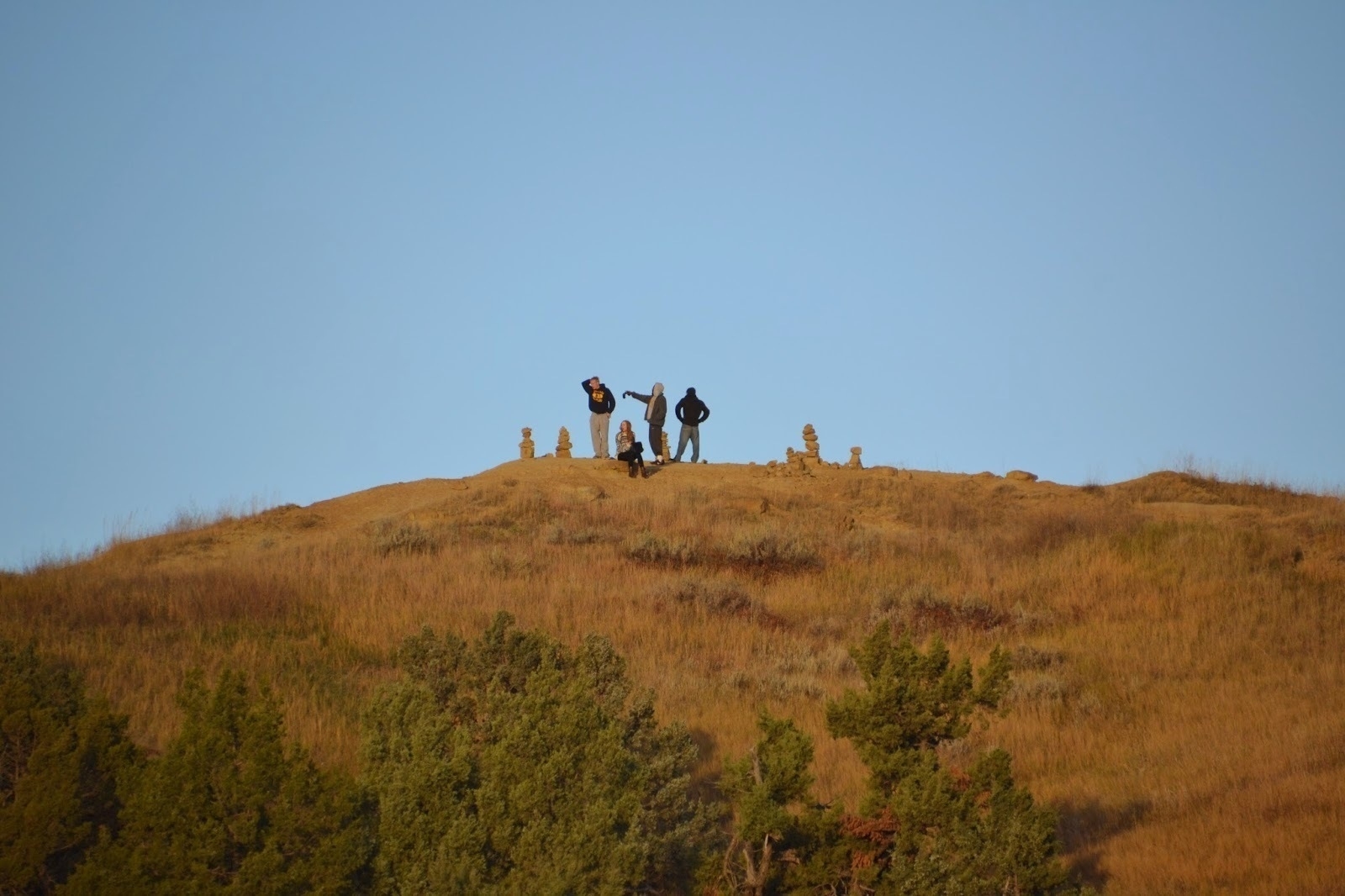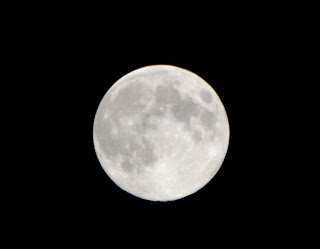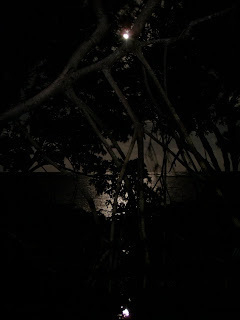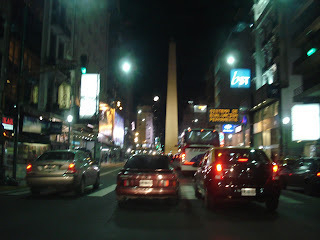astronomy
- fasts with feasts,
- days of rest with days of labor,
- celebration with food,
- the progress of our days with the progress of the skies,
- remembrance with anticipation,
- rejoicing with mourning.
∞
Commerce, Environmental Attention, and the Liturgical Calendar
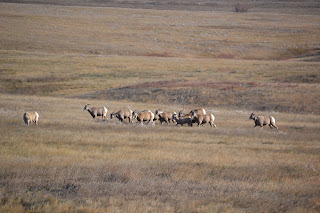 |
| Bighorn sheep in the Badlands National Park. The animals move together, responding to the land. |
Lately I've been reflecting on liturgy, and especially on liturgical calendars.
By "liturgy" I mean the work we do together on a regular basis. The word "liturgy" comes from two Greek words that mean "the work of the people," and it usually refers to the rituals of worship in a religious congregation: it's the formula for when and how and where we stand, sit, kneel, pray, etc.
Most religions I can think of have liturgical calendars that describe the regular cycle of rituals in a year. If liturgy usually refers to what we do when we gather for a holiday or a day of worship, a liturgical calendar organizes the year so that we know when those days occur. It usually gives a sense of the flow of time, connecting days to one another with some purpose: liturgical calendars connect
I used to think this was all silly, and a forced imposition on my freedom.
Lately I've been discovering that -- for me, at least -- the calendar's structure is a source of freedom from other calendars that don't help me to live well.
When I was younger I abandoned the liturgical calendar because I didn't want someone else telling me what days were holy. Why shouldn't they all be holy if I want them to be? And why should I fast just because someone else said we all should fast?
What I've come to see lately is that If we abandon the liturgical calendar with its times of feasting and fasting, the calendar doesn’t go away; it just becomes commercialized and turned into a calendar of constant consumption, constant labor. Feasting becomes purchasing; fasting becomes debt; and the two coincide with no time of rest between.
I experience the collapse of the calendar most where people like me have given it up and allowed others to co-opt it for commercial purposes. In simple terms, I experience it when I walk into a store in October and I hear Christmas music. All around me are ads telling me that my greatest obligation is to purchase things for Christmas, and to do so now.
This makes me want to shout: please spare me the Christmasy jingles, most of which drive me from your store. I like Christmas hymns, but the stress of being a cog in the machinery of holiday commerce has led me to appreciate the difference between Advent (a season of anticipation, of watching, and waiting) and Epiphany (a season of revealing, of celebration of birth, of discovery).
No one taught me this when I was young, but I've learned over the years that my tradition has different hymns for different times in the liturgical calendar. Now it feels odd to enter a pharmacy and to hear a hymn for the Nativity being played over the loudspeakers during Ordinary Time.
I used to think all that tradition to be nonsense. The older I get, the more I appreciate the thoughtful progress of a year, and the more I dislike the flattening of all days and all times into a yearlong, nonstop worship of commerce and toil.
We can't easily escape liturgical calendars, and I'm not sure we should. Even the birds of the air know when it is time to migrate, and they all have their liturgy of flight. The flowers know when to bloom, the salmon know when to spawn, the bears know when to look for the salmon. We humans used to know all these things, too.
Little by little we have lost connection to the liturgies that connect us to the land, the plants, the animals, the water, the wind, and the skies. When I ask my students what the phase of the moon is, it's rare that they know.
And I admit it is a wonderful thing not to need the moonlight. Running water, grocery stores, central heating, a solid roof, a functioning car, and many other modern conveniences are delightful. But they do come with costs; these good things are not free. They cost us money, which means we work more for them. And they have invisible costs, like the slow change of the quality of air in cities, the slow degradation of the planet's water, the slow loss of species around the world, the slow accumulation of things we throw away.
And then, when these slow processes pile up, we begin to notice them, and we begin to wonder: what have we done? We slowly gave up the liturgies of seedtime and harvest and replaced them with liturgical calendars in which all days are days of commerce and toil.
Which gives rise to new liturgies, urgent liturgies of anxiety. Look at what we have done, we say. With sackcloth and ashes we lament the fouling of our nest. As an environmental researcher, I see the fouling clearly and often, and I share that stress, that anxiety, that lamentation.
But if we replace the new liturgy of constant toil and waste with a newer one of constant lamentation over the toil and waste, we might wind up replacing one flattening of days with another.
I don't know the solution, and I don't intend to argue for returning to some halcyon past. Nor do I plan to argue for the imposition of my chosen calendar on others. But I do intend to reexamine the calendar I inherited, to dust it off and see what I missed when I put it aside. Sometimes old ideas are still good ones; some old seeds can still bear new fruit.
For now, what I propose is to mourn in some seasons, but also to rejoice in others. If there is mourning to do, it is also the case that there is still life to preserve. Each of these things--mourning and preserving, looking back at what is lost and looking ahead to what might flourish--calls for its own day. And each day calls for a calendar that can connect it to the other days in a way that keeps each day from dissolving into atomic time. Each day has some part of the whole of life. That part is worth seeing in its own day.
By "liturgy" I mean the work we do together on a regular basis. The word "liturgy" comes from two Greek words that mean "the work of the people," and it usually refers to the rituals of worship in a religious congregation: it's the formula for when and how and where we stand, sit, kneel, pray, etc.
Most religions I can think of have liturgical calendars that describe the regular cycle of rituals in a year. If liturgy usually refers to what we do when we gather for a holiday or a day of worship, a liturgical calendar organizes the year so that we know when those days occur. It usually gives a sense of the flow of time, connecting days to one another with some purpose: liturgical calendars connect
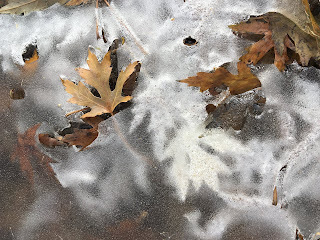 |
| Watching the seasons change: autumn leaves make imprints in the ice on my campus green. |
I used to think this was all silly, and a forced imposition on my freedom.
Lately I've been discovering that -- for me, at least -- the calendar's structure is a source of freedom from other calendars that don't help me to live well.
When I was younger I abandoned the liturgical calendar because I didn't want someone else telling me what days were holy. Why shouldn't they all be holy if I want them to be? And why should I fast just because someone else said we all should fast?
What I've come to see lately is that If we abandon the liturgical calendar with its times of feasting and fasting, the calendar doesn’t go away; it just becomes commercialized and turned into a calendar of constant consumption, constant labor. Feasting becomes purchasing; fasting becomes debt; and the two coincide with no time of rest between.
I experience the collapse of the calendar most where people like me have given it up and allowed others to co-opt it for commercial purposes. In simple terms, I experience it when I walk into a store in October and I hear Christmas music. All around me are ads telling me that my greatest obligation is to purchase things for Christmas, and to do so now.
This makes me want to shout: please spare me the Christmasy jingles, most of which drive me from your store. I like Christmas hymns, but the stress of being a cog in the machinery of holiday commerce has led me to appreciate the difference between Advent (a season of anticipation, of watching, and waiting) and Epiphany (a season of revealing, of celebration of birth, of discovery).
No one taught me this when I was young, but I've learned over the years that my tradition has different hymns for different times in the liturgical calendar. Now it feels odd to enter a pharmacy and to hear a hymn for the Nativity being played over the loudspeakers during Ordinary Time.
I used to think all that tradition to be nonsense. The older I get, the more I appreciate the thoughtful progress of a year, and the more I dislike the flattening of all days and all times into a yearlong, nonstop worship of commerce and toil.
We can't easily escape liturgical calendars, and I'm not sure we should. Even the birds of the air know when it is time to migrate, and they all have their liturgy of flight. The flowers know when to bloom, the salmon know when to spawn, the bears know when to look for the salmon. We humans used to know all these things, too.
Little by little we have lost connection to the liturgies that connect us to the land, the plants, the animals, the water, the wind, and the skies. When I ask my students what the phase of the moon is, it's rare that they know.
And I admit it is a wonderful thing not to need the moonlight. Running water, grocery stores, central heating, a solid roof, a functioning car, and many other modern conveniences are delightful. But they do come with costs; these good things are not free. They cost us money, which means we work more for them. And they have invisible costs, like the slow change of the quality of air in cities, the slow degradation of the planet's water, the slow loss of species around the world, the slow accumulation of things we throw away.
And then, when these slow processes pile up, we begin to notice them, and we begin to wonder: what have we done? We slowly gave up the liturgies of seedtime and harvest and replaced them with liturgical calendars in which all days are days of commerce and toil.
Which gives rise to new liturgies, urgent liturgies of anxiety. Look at what we have done, we say. With sackcloth and ashes we lament the fouling of our nest. As an environmental researcher, I see the fouling clearly and often, and I share that stress, that anxiety, that lamentation.
But if we replace the new liturgy of constant toil and waste with a newer one of constant lamentation over the toil and waste, we might wind up replacing one flattening of days with another.
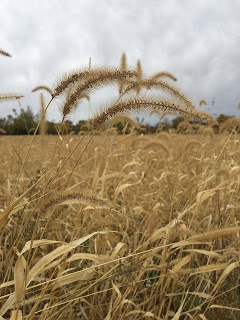 |
| Seedtime leads to harvest, and then seedtime again, with times of rest in between. |
I don't know the solution, and I don't intend to argue for returning to some halcyon past. Nor do I plan to argue for the imposition of my chosen calendar on others. But I do intend to reexamine the calendar I inherited, to dust it off and see what I missed when I put it aside. Sometimes old ideas are still good ones; some old seeds can still bear new fruit.
For now, what I propose is to mourn in some seasons, but also to rejoice in others. If there is mourning to do, it is also the case that there is still life to preserve. Each of these things--mourning and preserving, looking back at what is lost and looking ahead to what might flourish--calls for its own day. And each day calls for a calendar that can connect it to the other days in a way that keeps each day from dissolving into atomic time. Each day has some part of the whole of life. That part is worth seeing in its own day.
∞
Camping With My Students: Stargazing in the Badlands
Around two in the morning I awoke to the song of coyotes. I opened my eyes and looked up just in time to see a green meteor arc across the sky. I was camping outdoors, with my students, in a remote corner of South Dakota. Welcome to one of my favorite classrooms.
Each fall I look for an ideal weekend to take my Ancient and Medieval Philosophy students stargazing. An ideal weekend counts as one where we will have clear skies, a new moon, and reasonably warm weather so we can spend a lot of time outside.
Several times over the last ten years, the weather's been so good that we've been able to go out to a primitive campground (i.e. one where there is no electricity and almost no urban glow) in the Badlands National Park.
On such nights, in such places, the sky glistens with stars. The Milky Way is a bright band across the night, and meteors punctuate our views each hour.
I tell my students that this is an optional trip. They don't get credit for coming, and they don't lose any credit for staying home. It's a four-hour drive from our campus, so it's a real commitment of time on their part. Their only rewards are these: an experience of what the Norwegians call friluftsliv, a beautiful night under the stars in a remote and lovely place, and free pancakes at sunrise, cooked by me.
And yet every time I offer this trip, half a dozen or more students - and sometimes other professors - tag along.
I've written before about the importance of teaching outdoors and of doing labs in philosophy. Experientia docet, experience teaches us. What we learn through lived, full-bodied experience tends to stick with us far better than what we simply hear spoken from a lectern or see on a PowerPoint slide.
We go out there, ostensibly, to see the stars. This is because I want my students to watch the skies and to imagine what it would have been like for ancient and medieval philosophers like Thales, Plutarch, Ptolemy, Eratosthenes and, even Galileo (on the cusp of the Middle Ages) to gaze at the skies and learn from their movements.
But we are really there for other reasons that are easier to show than to tell. I want them to see that ideas do not grow up in a vacuum, and that the artificial divisions between academic disciplines are really artificial and convenient. Educated people should care about all the disciplines. We should not allow them to be compartmentalized, as though philosophy and sociology had nothing to do with accounting, or physics, or poetry.
Aristotle tells us that the love of wisdom begins in wonder. I will add that experience of new things can be the beginning of wonder.
Many of my students have never heard coyotes sing. In the Badlands, they trot past our cots and tents and sing to us all night long. When we wake in the morning, we are often surrounded by small groups of bison, slowly grazing their way along the hillsides. After breakfast we climb the steep slopes and find ancient fossils.
I don't know if any of this is a desirable or assessable outcome for a philosophy class. Also, I don't care. Because all of these things are, I think, desirable outcomes for life.
Because I believe that "it is beautiful to do so" is reason enough to sleep under the stars.
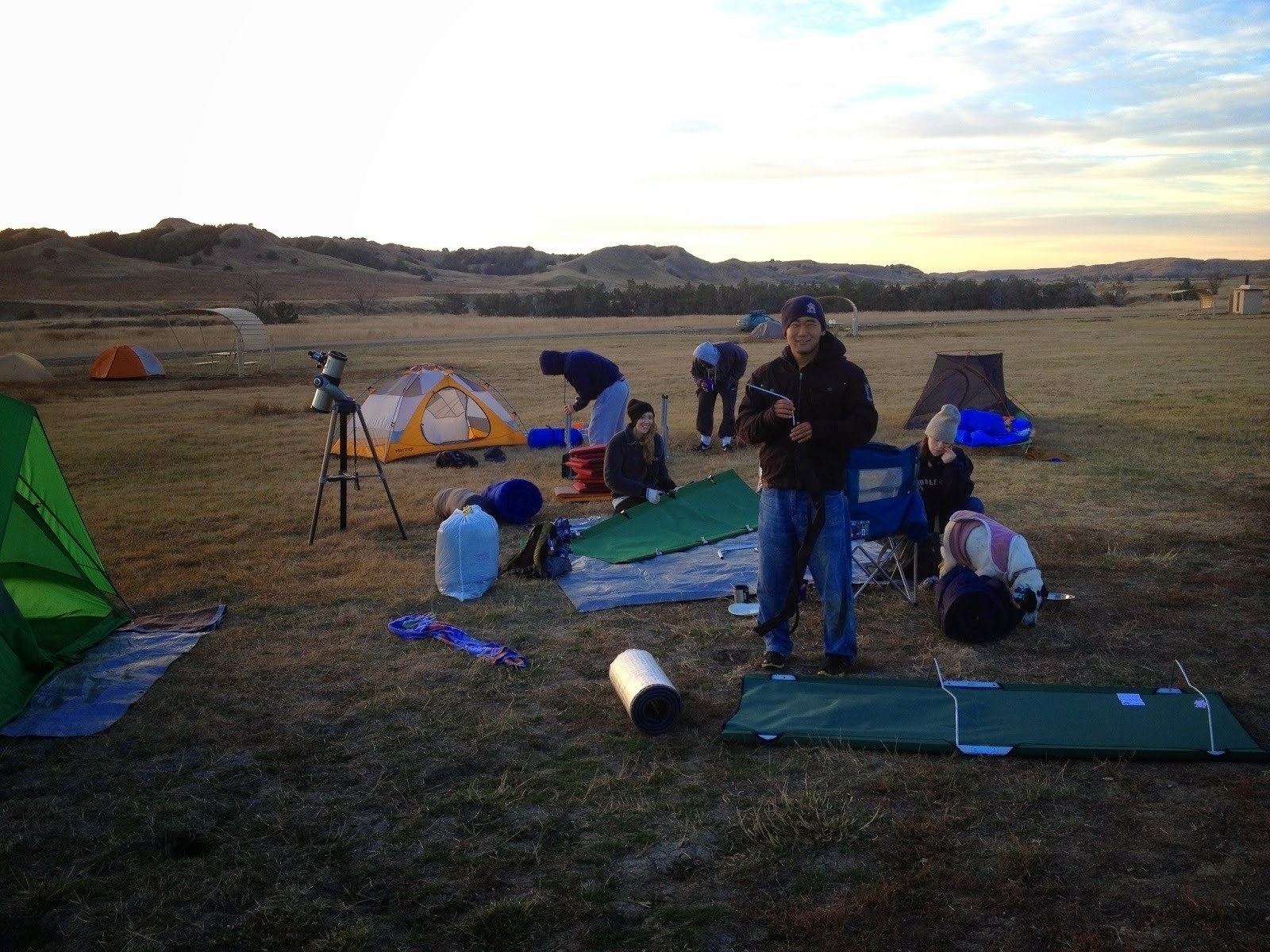 |
| We set up tents, but we rarely use them. Much nicer to sleep under the stars. |
Each fall I look for an ideal weekend to take my Ancient and Medieval Philosophy students stargazing. An ideal weekend counts as one where we will have clear skies, a new moon, and reasonably warm weather so we can spend a lot of time outside.
Several times over the last ten years, the weather's been so good that we've been able to go out to a primitive campground (i.e. one where there is no electricity and almost no urban glow) in the Badlands National Park.
On such nights, in such places, the sky glistens with stars. The Milky Way is a bright band across the night, and meteors punctuate our views each hour.
I tell my students that this is an optional trip. They don't get credit for coming, and they don't lose any credit for staying home. It's a four-hour drive from our campus, so it's a real commitment of time on their part. Their only rewards are these: an experience of what the Norwegians call friluftsliv, a beautiful night under the stars in a remote and lovely place, and free pancakes at sunrise, cooked by me.
And yet every time I offer this trip, half a dozen or more students - and sometimes other professors - tag along.
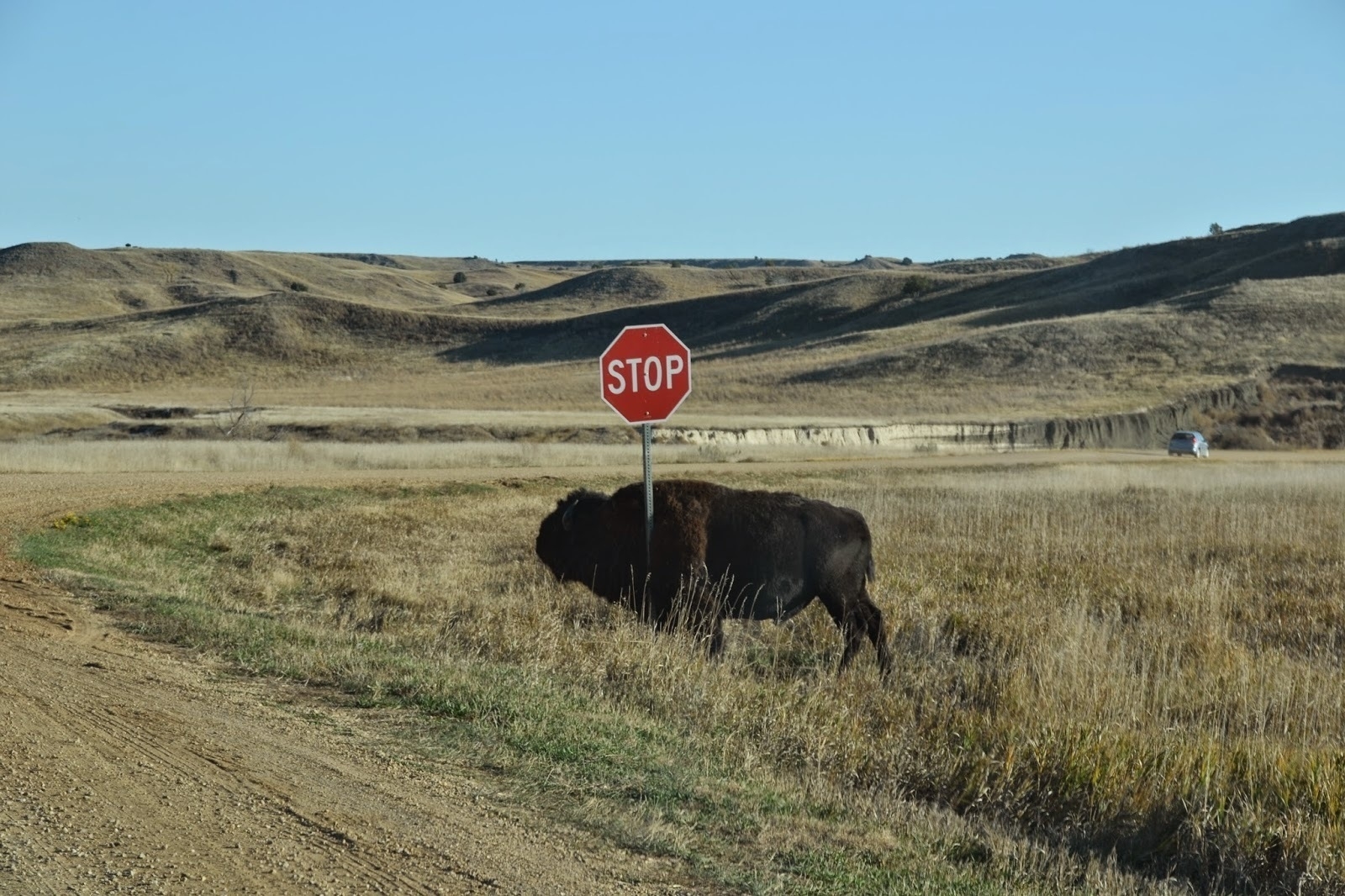 |
| The stop sign is just a scratching post to this bison. |
I've written before about the importance of teaching outdoors and of doing labs in philosophy. Experientia docet, experience teaches us. What we learn through lived, full-bodied experience tends to stick with us far better than what we simply hear spoken from a lectern or see on a PowerPoint slide.
We go out there, ostensibly, to see the stars. This is because I want my students to watch the skies and to imagine what it would have been like for ancient and medieval philosophers like Thales, Plutarch, Ptolemy, Eratosthenes and, even Galileo (on the cusp of the Middle Ages) to gaze at the skies and learn from their movements.
But we are really there for other reasons that are easier to show than to tell. I want them to see that ideas do not grow up in a vacuum, and that the artificial divisions between academic disciplines are really artificial and convenient. Educated people should care about all the disciplines. We should not allow them to be compartmentalized, as though philosophy and sociology had nothing to do with accounting, or physics, or poetry.
Aristotle tells us that the love of wisdom begins in wonder. I will add that experience of new things can be the beginning of wonder.
Many of my students have never heard coyotes sing. In the Badlands, they trot past our cots and tents and sing to us all night long. When we wake in the morning, we are often surrounded by small groups of bison, slowly grazing their way along the hillsides. After breakfast we climb the steep slopes and find ancient fossils.
I don't know if any of this is a desirable or assessable outcome for a philosophy class. Also, I don't care. Because all of these things are, I think, desirable outcomes for life.
Because I believe that "it is beautiful to do so" is reason enough to sleep under the stars.
∞
The Music of the Spheres: The Sun Is A Morning Star
Students in my Ancient and Medieval Philosophy class are required to spend at least four hours outdoors, gazing at the skies.
That may sound odd, but it arises from my conviction that philosophy needs labs. I call it my "Music of the Spheres" project, in which I invite them to consider what it would have been like to be Thales (who was one of the first to predict a solar eclipse), gazing at the night sky and thinking about the laws that seem to guide the motions of the celestial bodies.
The students are given specific instructions and they must come up with a clear research project that can be accomplished using only the tools available to ancient astronomers.
For me, the best part of the class comes at the end when I read their work, and I get to see their offhand comments, like this:
If you don't know what planets are visible right now; if you can't quickly identify a few constellations; or if you aren't sure what phase the moon is in, why not go outside and have a look? And why not share the moment with a friend?
The heavens are not yet done revealing themselves to us, and "the sun is but a morning star."
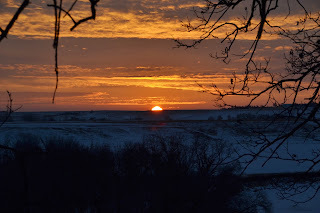 |
| The Morning Star, Good Earth State Park (SD), December 2013 |
That may sound odd, but it arises from my conviction that philosophy needs labs. I call it my "Music of the Spheres" project, in which I invite them to consider what it would have been like to be Thales (who was one of the first to predict a solar eclipse), gazing at the night sky and thinking about the laws that seem to guide the motions of the celestial bodies.
The students are given specific instructions and they must come up with a clear research project that can be accomplished using only the tools available to ancient astronomers.
For me, the best part of the class comes at the end when I read their work, and I get to see their offhand comments, like this:
"I saw the Milky Way and its Great Rift for the first time."My heart leapt when I read that one. This next one didn't make my heart leap, but it did make my heart glad, because it too is an important discovery:
"Stargazing is much more fun with a friend."We live beneath these skies but so rarely do we lie on our backs beneath them and gaze upwards. Rarely do we lift our eyes to the heavens to see what is there, and when we do, we are quick to turn away in boredom, as though it were a small thing to gaze into the greatest distances.
If you don't know what planets are visible right now; if you can't quickly identify a few constellations; or if you aren't sure what phase the moon is in, why not go outside and have a look? And why not share the moment with a friend?
The heavens are not yet done revealing themselves to us, and "the sun is but a morning star."
∞
The Course Of Nature and Laws of Nature
As part of the sabbatical leave I am currently enjoying I am spending a lot of time reading ancient and medieval texts, mostly on science and mathematics. The plan is to incorporate them into my ancient and medieval philosophy class next fall. I teach that class more as a history of texts than as a class on philosophical problems. The historical development of astronomy is one of the main threads we follow, tying it to discoveries in geometry, optics, metaphysics, ethics, epistemology, and politics.
Today I was reading this text from Book I of Manilius' Astronomica. I'll translate the relevant part below.
On the one hand, this sounds like an early articulation of the idea of laws of nature. If nature follows paths laid down by nature itself and from which it does not deviate, that would be compatible with our idea of a natural law.
Yet there's an important difference between law and path. As you walk along a path, your feet may fall more to one side of the path or the other; and over time, paths may shift, broadening with use or narrowing with desuetude. Charles Peirce, responding to advocates of Hume's argument against miracles, argues that nature is like this as well, and that what we now call laws were once called the course of nature, and Peirce thinks of them as habits that nature has taken on.
The name makes a difference, if only a slight one. Peirce was not trying to argue for particular miracles, but he was urging students of science not to insist that nature behave according to their preconceptions of law. Manilius' idea is not so far-fetched: the laws might not have been there at all, but nature took them on and then, once they became habits, nature has stuck to them. Thinking about science this way alerts us to two possibilities: first, that things might not always have been as they are, and second, that nature might still be taking on new habits. We shouldn't expect nature to stray far from its habitual paths, but on the other hand, what would prevent it from doing so?
Today I was reading this text from Book I of Manilius' Astronomica. I'll translate the relevant part below.
The boldface text could be (loosely) translated like this: "Nature follows paths that she herself has made, and she does not stray as the inexperienced do."Nam neque fortuitos ortus surgentibus astrisnec totiens possum nascentem credere mundumsolisve assiduous partus et fata diurna,cum facies eadem signis per saecula constet,idem Phoebus eat caeli de partibus isdemlunaque per totidem luces mutetur et orbeset natura vias servet, quas fecerat ipsa,nec tirocinio peccet, circumque feraturaeterna cum luce dies, qui tempora monstratnunc his nunc illis eadem regionibus orbis,semper et ulterior vadentibus ortus ad ortumoccasumve obitus, caelum et cum sole perennet.
On the one hand, this sounds like an early articulation of the idea of laws of nature. If nature follows paths laid down by nature itself and from which it does not deviate, that would be compatible with our idea of a natural law.
Yet there's an important difference between law and path. As you walk along a path, your feet may fall more to one side of the path or the other; and over time, paths may shift, broadening with use or narrowing with desuetude. Charles Peirce, responding to advocates of Hume's argument against miracles, argues that nature is like this as well, and that what we now call laws were once called the course of nature, and Peirce thinks of them as habits that nature has taken on.
The name makes a difference, if only a slight one. Peirce was not trying to argue for particular miracles, but he was urging students of science not to insist that nature behave according to their preconceptions of law. Manilius' idea is not so far-fetched: the laws might not have been there at all, but nature took them on and then, once they became habits, nature has stuck to them. Thinking about science this way alerts us to two possibilities: first, that things might not always have been as they are, and second, that nature might still be taking on new habits. We shouldn't expect nature to stray far from its habitual paths, but on the other hand, what would prevent it from doing so?
∞
Look Up!
Just saw this over at Slate and had to post it here. It's a beautiful animation of a full year of the phases of the moon, done by NASA.
If you like that, you might also like something I wrote about looking at the moon a year ago.
Guarda la luna, la bella luna!
If you like that, you might also like something I wrote about looking at the moon a year ago.
Guarda la luna, la bella luna!
∞
I like to begin my class on ancient and medieval philosophy with two questions: (1) Do we know more about the moon than they knew five centuries ago? (2) Do you know what phase the moon is in right now?
Of course, most of us would say "yes" to the first question, and with good reason. After all, we've been to the moon several times, and we've brought samples back. We have remarkable technologies for remote sensing. The sciences have gone beyond what most people even a century ago could have imagined.
The second question might be harder to answer without looking up the answer somewhere. When I ask my students, usually none of them know the current phase of the moon. A recent facebook poll I gave my friends yielded many more positive replies to the second question. Not a very scientific poll, since it might be that many who did not know simply chose not to reply out of shame. Still, fewer than half of those who replied said they did know the moon's current phase.
I can think of no reason to be ashamed of not knowing the phase of the moon. Most of us have no need to know it, and I don't ask the question in order to scold my students, but to point out something about how our knowledge has changed. It seems likely to me that five hundred years ago many more people would have been aware of the phase of the moon. Children who play outside, farmers, fishers, sailors, and soldiers all wind up depending on the moon, or at least having considerable exposure to it. Today, very few of us have reason to notice it, because our lives have changed so much.
This brings me back to my first question: do we know more about the moon today than they knew five centuries ago? In one sense, the answer is still obviously "yes." But in another way, it has to be "no." Most of us (myself included) don't pay much attention to the moon. Our knowledge of its phase is not the knowledge of familiarity but rather confidence that, if we needed to know, we could look it up somewhere. We have confidence in the knowledge of our community, and of its possession of data.
Which leads me to a third question: Is it enough to know that someone else knows the answer? Sure, we don't need to know what the moon looks like right now. But if you haven't taken a little time to stare at it lately, you might have forgotten something worth knowing: the moon is beautiful. Go have a look.
******
Photos: (top) Full moon over Sioux Falls, SD, summer, 2011. (middle) The moon rises over the Atlantic and shines through mangroves in Belize, January, 2011. (bottom) The moon rises over Buenos Aires, August 2010.
Do You Know The Phase Of The Moon?
I like to begin my class on ancient and medieval philosophy with two questions: (1) Do we know more about the moon than they knew five centuries ago? (2) Do you know what phase the moon is in right now?
Of course, most of us would say "yes" to the first question, and with good reason. After all, we've been to the moon several times, and we've brought samples back. We have remarkable technologies for remote sensing. The sciences have gone beyond what most people even a century ago could have imagined.
The second question might be harder to answer without looking up the answer somewhere. When I ask my students, usually none of them know the current phase of the moon. A recent facebook poll I gave my friends yielded many more positive replies to the second question. Not a very scientific poll, since it might be that many who did not know simply chose not to reply out of shame. Still, fewer than half of those who replied said they did know the moon's current phase.
I can think of no reason to be ashamed of not knowing the phase of the moon. Most of us have no need to know it, and I don't ask the question in order to scold my students, but to point out something about how our knowledge has changed. It seems likely to me that five hundred years ago many more people would have been aware of the phase of the moon. Children who play outside, farmers, fishers, sailors, and soldiers all wind up depending on the moon, or at least having considerable exposure to it. Today, very few of us have reason to notice it, because our lives have changed so much.
This brings me back to my first question: do we know more about the moon today than they knew five centuries ago? In one sense, the answer is still obviously "yes." But in another way, it has to be "no." Most of us (myself included) don't pay much attention to the moon. Our knowledge of its phase is not the knowledge of familiarity but rather confidence that, if we needed to know, we could look it up somewhere. We have confidence in the knowledge of our community, and of its possession of data.
Which leads me to a third question: Is it enough to know that someone else knows the answer? Sure, we don't need to know what the moon looks like right now. But if you haven't taken a little time to stare at it lately, you might have forgotten something worth knowing: the moon is beautiful. Go have a look.
******
Photos: (top) Full moon over Sioux Falls, SD, summer, 2011. (middle) The moon rises over the Atlantic and shines through mangroves in Belize, January, 2011. (bottom) The moon rises over Buenos Aires, August 2010.
